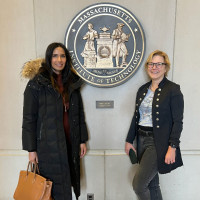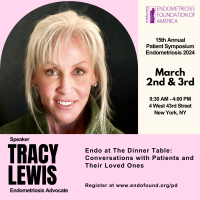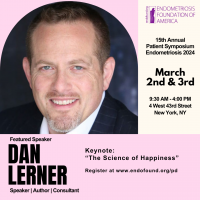Heather Guidone
The one thing I wanted to say, I know a lot of the patients you have heard from today, myself included, because I am also a patient, were obviously older. We are not the teens in your locker room, in your schools and in your clinic. We are what happens when it remains untreated or improperly treated. I really wanted to point that out. I know we are running a little behind, thank you for your patience.
I am so, so excited to introduce our next speaker, she probably needs no introduction. She is the guru, literally. Donna Cardillo is a nurse who travels the world helping other nurses to be happy in their own careers, to reach their full potential. She is fiercely passionate about nursing and life in general, god bless her. You may know Donna best as “Dear Donna” at Nursing Spectrum, Nurse Week Magazines where she writes a regular column. She also doles out daily advice and career information and expertise at nurse.com. She is also Dr. Oz’s expert nurse blogger, the only expert nurse blogger there. She has numerous awards received and recognitions but she is most proud of being named a Diva in Nursing by the Institute for Nursing in New Jersey for its outstanding achievements and excellence in practice. She is also the author of three books, Your First Year as a Nurse, The Ultimate Career Guide for Nurses and A Day Book for Beginning Nurses. She has been referred to as the Ann Landers and the Dr. Phil of the nursing profession. We love her no matter who she is compared to. There is no denying that she has her own unique style, indomitable spirit and a very, very good sense of humour. Donna is really going to talk about how do you as your true community health care leaders, how do you embrace your roles? So please join me in a very special welcome for Donna Cardillo.
Donna Cardillo
I was recently travelling on business, as I often do, when I struck up a conversation with a man sitting next to me on an airplane. When I told him I was a registered nurse he paused for a moment, furrowed his brow a little bit and he said very seriously, and almost in a reverent tone, he said nurses are the backbone of health care. I had to agree with him. Because, after all, we provide the lion’s share of care. We spend more time with patients than any other health care provider. We are fierce patient advocates but maybe even more importantly we are health care educators, we are experts in health care in our own right and health education has become, and will be an even more important role as we move forward in the future, talk a little bit about how health care is evolving. When we talk about educating the patient, the client, the health care consumer, whatever you want to call them – and by the way can I see a show of hands here – who here in the room is a health care consumer? Okay, I hope every hand goes up, just trying to make a point there because sometimes when we are health care providers we forget that we are also health care consumers. When we talk about educating patients, clients or health care consumers I cannot think of the importance anymore of educating when we talk about the youth of the United States – right? Where to do we have most regular and direct access to the youth in our country? In our schools, so who then, what health care provider has the greatest access to young people in this country? School nurses, absolutely, no question about it. You certainly have great opportunities to teach in that environment but teaching does not just occur in a classroom, it also occurs in one on one interactions with students. Years ago we had more time to treat people, the pace was a bit slower there were more resources and more help around. Nurses complain today that they really do not have time to do patient teaching but you do not have to have a separate time to teach you can incorporate teaching into your one on one interactions, just something that you can naturally do. And you are not just teaching students you are teaching teachers, you are teaching health care administrators and other people that work in the school system. You are teaching parents. You have access to all these people. And you are teaching the larger community as well, because every school nurse, really every nurse is a community health educator. There are a lot of opportunities to teach and get the word out.
Just one good example, I was on an airport shuttle recently. I was going from my hometown to the airport as I often am doing, and because I ride the shuttle regularly I know most of the drivers who are friendly. The driver that day was a gentleman who had previously told me that he was diabetic. We are driving along and I am sitting up front shot gun because the van was full that day and he said, “Why don’t you sit up front?” We were having a friendly conversation and I noticed that he a one litre bottle of diet soda that apparently he is drinking during the day and I said, I already knew he was diabetic, so I said, ‘Patrick, how many of those sodas do you drink a day?” He said, “About three or four of them”. I said, “Patrick, you may not be aware of this, but you are consuming a lot of artificial sweeteners when you drink that soda” not to mention caffeine. I did not want to get the conversation too out of control. I wanted to keep it somewhat focused but I just said to him, “You are consuming a lot of artificial sweeteners and I understand why you are drinking diet soda but you might be interested to know that consuming that many artificial sweeteners can give you some headaches, can cause confusion and…” I just gave him a couple of symptoms. I did not want to get too serious because he was driving after all at the time. His eyes started to get wide as I said that and he said, ‘Oh my God, I never would have equated the soda with some other issues that I was having. So, it was just a teaching moment. And how do I know so much about artificial sweeteners and soda? I had recently written a blog post about it at droz.com, interesting. So, once we had that conversation the other people in the van hear the conversation and they say, “Oh you’re a nurse can I ask you a question? What is body mass index? What is BMI, what does it mean? How do they measure it? How important is it?” So, really we had a free clinic pretty much on the shuttle on the way out to the airport.
Why am I telling you that story? Because there are opportunities to teach and get the word out and make a difference in almost every possible situation. Even in social situations because we are focusing on endometriosis today. In a social situation you certainly would not go up to somebody and say, “Any heavy bleeding or clotting or cramping lately?” That would not be a good social conversation but a great way to open the conversation would be to say, “Oh, does anybody here watch TV’s Top Chef?” Some people would say yes, some people would say no. You could say, “I just recently met Padma Lakshmi who is the host” and somebody would say, “Wow, where did you meet her?” That would be a perfect entre for you into saying that you had come to a conference today and Padma has endometriosis, shared her story, is co-founder of the Endometriosis Foundation. I am just giving you some tips on how even you can introduce general health care subjects and gauge people’s interest and get some good information out even in social situations. We talk about health care and social situations anyway. If you do not bring it up somebody else is going to, right? They are like, “Oh, you’re a nurse? Well, I can tell you this then”. You never know what is coming up when that happens, right? Oh my gosh!
You really have a unique opportunity to make an enormous difference. What happens, as I said, is we often get caught up in tasks and treating symptoms and illness and if you only see yourself in that role you really could be underplaying that role, which is something we have a tendency to do in nursing very often. We get very caught up in tasks and we forget our primary role as health educator. As I mentioned, it does not just occur in the classroom, one on one you certainly…I would encourage you to look for opportunities to do presentations to students. Do presentations at PTO meetings, to parents, to teachers, it is a good thing to do. Consider writing articles for your school newsletter. If you do not have a school newsletter many school nurses…I do a lot of work with school nurses across the country through the National Association of School Nurses and through Johnson and Johnson, they have a lot of programs to support school nurses. Many school nurses across the country have started their own health and wellness newsletter, it is another way to showcase your expertise, it is another way to teach, it is another way to make a difference, another way to get the word out. These are a couple of suggestions for you. You could even consider writing an article for your local newspaper. As an RN, as I mentioned earlier, we are health care experts in our own right. Correct? When John Ritter the comedian died a number of years ago, and you may recall he died from a ruptured aortic aneurism, it was a shock when he died, wasn’t it? He was very young, he was very well known, very well loved. He was on a popular sitcom at the time. The public could not understand what had happened and why they could not save him. People would say, “What is a ruptured aortic aneurism? Why couldn’t they save him? Why didn’t anybody ever find it beforehand because there was a great lack of understanding about it?” So, I know a nurse who wrote an article about what an aortic aneurism is in layman’s language. She wrote it for the local newspaper to explain what happened. That was a great way for us to get our voice out there to teach, to disseminate information. You do not have to be a physician to bring health care information out. We are accustomed to deferring to physicians very often in nursing, especially those of us who have been in nursing for a long time. Things have changed quite a bit over the years.
Speaking of that, what we are accustomed to doing in the past health care is going through a complete, complete reinvention of itself right now. It is changing and shifting in so many ways. The old health care model was based on treating acute illness, correct? That is what everything was based on. Not only the care model that we had for hospitals, but also medical education and medical schools, nursing education and nursing schools were based on that acute care treatment model. What is happening now is the shift is going to health and wellness and management of chronic illness because chronic illness has become an epidemic in the United States. That is a great opportunity for nurses because promoting health and wellness and health education is something that we are very good at, that we do on a regular basis. And managing chronic illness, there is an increasing number of studies, we are not MPs, not advanced practice nurses, but regular registered nurses are working with people who have chronic illness and are getting great results having even better outcomes in some cases.
So this is where, why and how nurses can play a really pivotal role in health care as we move forward. It is a lot to think about and it is a very exciting opportunity for us, we have never had as many opportunities as we have now.
I also want to bring up another important subject because we are talking about you getting the word out, being pivotal in the community, opportunities for education. Because I am working with school nurses across the country I know that many of you are fighting to save your jobs right now. Your positions are being cut, you are being cut in half, they are being cut completely. Budgets are being cut, looking to save money on education so where do they save money? Let us get rid of the school nurse. We can have a secretary give out medication or do whatever needs to be done. Part of the reason that I am talking to you about adding value about positioning yourself as a health care expert in your school and your community is also to get more visibility, to get more credibility to position yourself as a health care expert in your school system and in your community. You are fighting for your job because we can talk all we want today about the role you play and the opportunities that you have but if your position gets cut and you are not there anymore what difference does it make? That is another reason to do all the things we are talking about today, showcase your knowledge and in the larger context, as I said, every school nurse, actually every nurse, is a community health nurse and there are opportunities to make a difference out there.
The gentleman I spoke with on the airplane, he said that nurses are the backbone of health care; I always say that nurses are the heart of health care. I would like to say today, and leave you with this, that it is time for all of us to own our power. Many nurses are uncomfortable with the word power but I recently found a great quote, it said the sole advantage of power is that you can do more good. I challenge you to own your power, step up to the plate, I want to talk about working to the full extent of your license, doing as much as you possibly can, helping to lead health care into the future. Padma said earlier that nurses are the first line of defence in a young woman’s health, especially her gynaecologic health, and that is very true. It leaves us with an awesome responsibility but more so an awesome opportunity to really make a difference with endometriosis and every other possible thing that is out there as well as promoting health and wellness.
I love you all. You have a great opportunity. I know already you do an amazing job. It is just a different way of thinking and incorporating more things than what you already do. Please feel free to contact me if I can help you in any way to do a bit more speaking, to do more writing and to get the word out. Thank you.
Our mission is to increase endometriosis awareness, fund landmark research, provide advocacy and support for patients, and educate the public and medical community.










